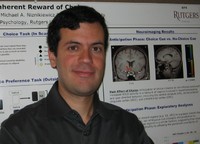Some Insights from Brain Researchers at Rutgers University, Newark

NEWARK, NJ -- A lot is being written about the effects of social media on the brain, how it may be changing the neural circuitry, shortening attention spans and reducing deep thinking and creativity. A group of researchers at Rutgers University in Newark, however, point out that as of date there is little hard science to prove how social media may be changing the brain’s neural networks. What is known is that social media is now firmly part of our society and we have the choice to control it or not.
The key point is whether one is in the driver’s seat or is being pulled along by the technology, notes Dr. Mauricio Delgado, director of the Lab for Social Affective Neuroscience in the Department of Psychology at Rutgers-Newark.
“For some people it’s a plus. It all depends on the urge and your ability to control it or shut it off,” he s

Dr. Paula Tallal, a Board of Governors’ professor of neuroscience at the Rutgers Center for Molecular and Behavioral Neuroscience (CMBN) and a pioneer researcher in the science of brain plasticity, adds that social media now is a critical part of training people to function well in society. “Social media is training us for the environment we live in now,” she says
She further notes that it also is a great tool for building communities where none existed before. One example is when students in a large lecture class start texting one another after class and end up forming smaller groups that can interact about the course material and other interests. “It’s like the idea behind sororities, fraternities and sports; it’s breaking people into small groups where they can feel connected,” she says.
The question people need to ask themselves, the researchers say, is whether social media is a benefit or hindrance in their lives.
“If it’s starting to cause problems in your daily life, if you can’t remember what was said in class because you were busy texting, then you have to consider whether it’s become a compulsive behavior,” says Delgado.
Dr. Joan Morrell, a professor of neuroscience at CMBN, who studies the neural circuitry that drives motivation, points out that in cases where social media has become a severe addiction that behavior most likely is masking a deeper issue.
“It’s som
“If things are going on in your life that don’t allow you to meet your goals or are interfering with your ability to sleep, eat well and study, you need to reach out for appropriate help,” she says.
The reasons why social media can potentially become “addictive” appear to be twofold. First, it’s a social reinforcer, says Delgado. The basic principle of social reinforcement is that people are more likely to perform a specific behavior if it is directly followed by something pleasurable, such as a “Like” on Facebook. Second, just as it has been shown with video games, social reinforces such as receiving positive comments may be firing up the reward circuitry in the brain.
One of the reward circuit’s natural functions is to provide a pleasurable feeling in response to outcomes of behaviors that are necessary for sustaining life, such as eating, to encourage repetition of that behavior. Addictions can develop when the pursuit of rewards becomes compulsive or obsessive.
The good news with social media, says Delgado, is that it’s a behavioral issue and one most people can attempt to control. “It’s not a drug dependency.”
His recommendation is that people should develop a strategy so they don’t end up becoming that person who is having dinner with a friend but texting other people.
“Just like any behavioral issue, like I drink too much soda, I shop too much, be aware of it and control it. Turn off the alert and vibrate on your phone. Have times when you are not connected to a screen and enjoy the environment and people around you.”
For students just starting college, the researches advise resisting the urge to text and check Facebook while in class. Pay attention to what is being said and turn off the phone. It may not be easy for those who have been raised looking at screens nearly every waking hour, but it is possible.
Students, says Morrell, should be mindful that they or their parents are paying for their education after the students worked hard to qualify to meet the admission standards of the university. “Not giving classes and class work their fullest attention will likely undermine their larger goals,” she says.
For those who find they are unable to control the social media urge, her strong recommendation is to turn to a mental health professional who can help with regulating that behavior. “Sometimes you just need some tools and behavioral strategies to get the most out of life.”
Media Contact: Carla Capizzi
973 353 5263
E-mail: capizzi@rutgers.edu